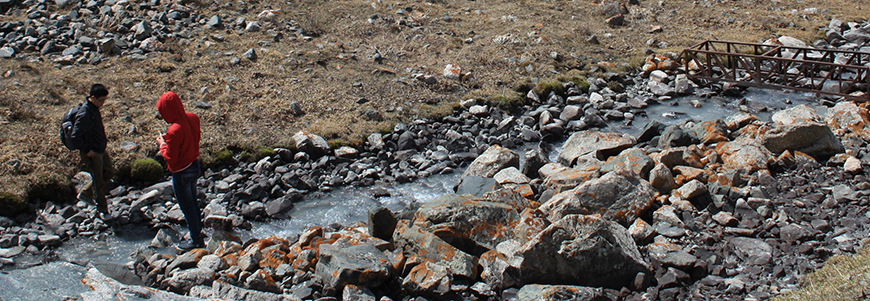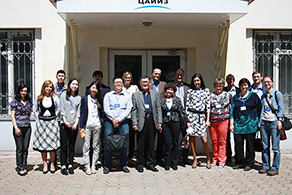Kicking-off the GlaSCA-V Project
From April 28th to 30th 2015, 25 researchers and young scientists from Germany and Central Asia met in Bishkek (Kyrgyzstan) to officially launch the GlaSCA-V project. The project aims at quantifying climate change impacts on natural water availability and its potential socio-ecological consequences in high mountain areas of Central Asia.
For the Kickoff meeting, the researchers combined a one-day workshop with an excursion on the topics of water diversions, climate and runoff monitoring in the Ala-Archa catchment and a first sampling campaign. In addition, first talks to stakeholders in the Chu river basin were organized. The project "Changes in Glacier and Snow-melt runoff components in Central Asia and societal Vulnerability, GlaSCA-V", coordinated by GFZ section Hydrology, is funded by Volkswagen-Stiftung for the period 2015-2017 and is complemented by a 2-year pilot study supported by the International Bureau on behalf of the German Federal Ministry for Education and Research. The meeting was hosted by the Central Asian Institute of Applied Geosciences in Bishkek, an affiliate of GFZ.
The research focuses on three transboundary river basins in the northern Tien Shan. The Ala-Archa catchment south to Bishkek serves as the experimental site in the frame of the pilot study. In this catchment, water storages and flows will be sampled on a regular basis to quantify the contributions of individual runoff components such as snow and glacier melt, rain and groundwater to total river flow. The results of chemical and isotopic analysis will be used for the verification and adjustment of hydrological models and later on for modeling large-scale changes in river runoff in the Chu and Ili river basins.
Further project partners are the Helmholtz-Centre for Environmental Research, UFZ, Institute for Environment and Human Security der United Nations University in Bonn, das Tian Shan Policy Center of the American University of Central Asia, the Kyrgyz-Russian-Slavic University in Bishkek, and the Regional Centre for Hydrology in Almaty. Representatives from the state agencies for hydrometeorology from Kazakhstan, Kyrgyzstan and Tajikistan joined the meeting as associated partners of the pilot project.









![[Translate to English:] Torsten Sachs in front of a climate station on a field](/fileadmin/_processed_/3/9/csm__TorstenSachs_bearbeitet_GS_4a1365ef84.jpeg)

![[Translate to English:] left image flood at the Ahrtal: image from above, several houses are flooded; left image:: Heidi Kreibich;](/fileadmin/_processed_/4/4/csm_Bild2_9af0130e9f.png)



![[Translate to English:] Start der Vega Rakete](/fileadmin/_processed_/6/4/csm_20231201-kachel_Vega-VV23-launch_ESA-CNES-Arianespace_706716b68c.jpeg)









![[Translate to English:] Poster exhibition at the Brandenburg Hydrogen Day at the GFZ, some participants in the foreground](/fileadmin/_processed_/6/5/csm_Erster_Brandenburgischer_Wasserstofftag_GFZ_402fcec95e.jpeg)
![[Translate to English:] Group picture of the participants](/fileadmin/_processed_/9/4/csm_20231108_CAWa-Workshop-Tashkent_Gruppenbild_99ea779d8a.jpeg)

![[Translate to English:] [Translate to English:] Hörsaal](/fileadmin/_processed_/e/6/csm_H%C3%B6rsal_e21ac645fb.jpeg)


![[Translate to English:] The Delegations in the Historic Library on the Telegrafenberg. In the back there are from left to right, the Dutch Ambassador for Germany, Ronald van Roeden, the Dutch Minister for Education, Culture and Science, Robbert Dijkgraaf and the scientific director of the GFZ, Susanne Buiter.](/fileadmin/_processed_/d/b/csm_Kachel-2_9eba4b4212.jpeg)

